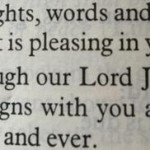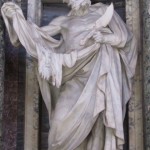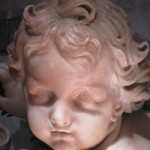I’ve focused a lot about Morning Prayer and Vespers in my writing, as evidenced by the podcasts, and I have certainly loved praying the Hours out of my Christian Prayer Breviary for the past ten years.
I used the breviary to pray all of the hours, of course, but Vigils (or, what is now called the Office of Readings – OOR) was limited therein. Some years ago I had bought the full 4 volume set of the Liturgy of the Hours (used, for a great price) but I’d never used the set because I thought I was too stupid to figure it out.
In truth, the full LOTH is very easy to use; I simply was not “ready” to use it.
Since my retreat in August, however, having sat in the chapel and prayed the Office with the good nuns, I’ve stopped being intimidated by the OOR, and it is now the office that begins the day -even before Morning Prayer- and it is so beautifully rich that it is like beginning a meal with a small but intensely provocative spoonful of goat cheese and wild honey.
Today, I opened my eyes in grief, because of a situation going on within my family that is causing me pain partly because I am so recalcitrant and backward, and partly because my backwardness makes me ill-prepared to deal with it. And so even before my feet hit the floor I was pleading with God about it, and also petitioning Him with my anxieties for family members, and for a writing project I am having real difficulty with.
So, I did my stiff-legged morning-arthritis walk to the Oratory, lit my candles, covered my head and settled down to the Liturgy, beginning as ever with the Invitatory, and then this morning’s Office of Readings, which began with the antiphon: Lord, let my cry come to you; do not hide your face from me
I cannot tell you how often I open the LOTH and find in the antiphon and psalms the exact reflection of where my heart and mind are. This should not surprise, though. The psalms are a perfect reflection of the human condition – even the “cursing” psalms, which can be terrifying because they so accurately articulate that which is alive within us that can ultimately destroy us.
This morning, we had Psalm 102, and it was just what I needed:
I have become like a pelican in the wilderness,
like an owl in desolate places.
I like awake and I moan
like some lonely bird on a roof.
but oh, how it ends – on what a note of triumph:
Long ago you founded the earth
and the heavens are the work of your hands.
They will perish but you will remain.
They will all wear out like a garment.
You will change them like clothes that are changed.
But you neither change, nor have an end.
A beautiful depiction of the constant-renewal of the world and all Creation in it, including you and me. I prayed the psalms and considered the slow lifting of the darkness on this overcast autumn day, the first-turning leaves, from green-to-gold. Summertime has reached its absolute fullness, and -being wholly and fully summer, and incapable of being more of what it is- it leaves us now, and the slow but inexorable winter begins the process of reaching its culmination, of becoming wholly and fully winter, until it can be no more of winter, and so forth.
God arrays himself in the splendor of all of it, wears it out like garments needing changing.
And that is us, as well. If we are to be Christ to each other, to become the presence of God that is Love, Mercy and Justice, to each other, then our whole life is, like winter and summer, the quest to become wholly and fully ourselves, who we were created to be, in Christ, until we cannot be more of what we are.
Quest of a lifetime, and the quest of a day. It is, in truth, the quest of each minute and millisecond: to be wholly and fully what we are, in every particular moment, as we move to culmination -through Him, with Him, in Him- day by day, minute by minute.
And in all of that, we are His raiment, and whether we consent to it or not, we will eventually be worn out and put away, and He will go on, living in others, arrayed in whatever garment they offer. Whether we are thin, fat, old, young, fit or paralyzed, or even “born with half a brain,” God suits up within us, and we either let him do his thing, or we hold him back. If we cannot make him a perfect Temple, we have the opportunity, at least, to say “it’s all I have, O Christ, but please use it as you will.”
Well, if God is going to suit up with us -and he is- then no wonder Thomas Merton looked at the people at Fourth and Walnut and saw them shining like the sun!
Of course, if we offer to be used, we’d better mean it, because as we have seen time and again, when you make that offer, Christ will use you until you are completely and wholly used up, until you are nothing more than cinder. Until you can’t be summer anymore and must burst into splendid autumn.
But maybe that’s the point. Being used up is what brings the splendor, but we don’t trust that; we hold ourselves back, insist on maintaining the illusion that we have real control over anything. It is easier to believe in all we see than in what we do not see. We can look at a John Paul II, hunched over and suffering and think, “well, that man has certainly been used up” and believe that his afterlife will be spent in the glorious light that makes other light seem like mere shadow. But then we can look at someone good-looking, healthy and wealthy and say, “gee…that looks kind of nice…” The attractive, earthly stuff makes it so easy to pull back from opening ourselves fully, trustingly, to God’s love. Trust feels more reckless than it really is.
Rewards on earth or in heaven; what we are open to is what is going to come our way. What we offer is what we will have returned to us, manyfold; paradoxically, what we give away is what we receive, and then what?
Watch the leaves as they move with a stream; some get hung up on the edges and they never make it downstream – they simply decay where they are. Others get caught in nooks, trapped and unable to move without the assistance of a stiff breeze stirring the flow. Others ride the current smoothly, following its course over rocks and twists. All of the leaves, no matter how they wander, eventually disappear, and their parts are played out and over. Whether they ended up on the river’s edge or disappeared into the basin all eventually become food for something else, and so do we.
And autumn will turn to winter, and we will fade and fall like the leaves and the snow. Eternity is there; it goes on, and so do we. While we live we are food for each other, nourished on the Living Bread. When we have faded, well, that is when we find Mercy. And also Justice. Fullness. Eternity.
The Second Reading from the OOR was from an instruction by Saint Columban, Benedictine Abbot
How blessed, how fortunate, are those servants whom the Lord will find watchful when he comes. Blessed is the time of waiting when we stay awake for the Lord, the Creator, who fills all things and transcends all things.
How I wish he would awaken me, his humble servant, from the sleep of slothfulness, even though I am of little worth. How I wish he would enkindle me with that fire of divine love. The flames of his love burn beyond the stars; the longing for his overwhelming delights and the divine fire ever burn within me!
How I wish I might deserve to have my lantern always burning at night in the temple of my Lord, to give light to all who enter the house of my God. … Give your light to my lantern, I beg you, my Jesus, so that by its light I may see that holy of holies which receives you as the eternal priest entering among the columns of your great temple. May I ever see you only, look on you, long for you; may I gaze with love on you alone, and have my lantern shining and burning always in you presence.
Oh, yes, the Office of Readings is really, really good stuff. I am sad that it took me ten years to find it, but then, we are only ready when we are ready.
And the Responsory:
The sun shall no longer be your light by day,
nor shall the brightness of the moon shine on you at night.
–The Lord shall be your everlasting light,
and your God shall be your glory.
Your sun shall never set,
nor shall your moon withdraw.
–The Lord shall be your everlasting light,
and your God shall be your glory.
Here are the readings from Mass.
After all of that, and some time with the Rosary, who wants to look at news and illusions? Not me. There’s far more interesting stuff here.
Related:
To Sit by an Open Window











